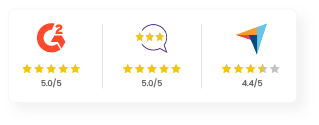Revolutionizing Workforce Upskilling with Agentic AI and LMS in 2025

There’s something fascinating happening around us and it’s so much more than just about automation now. It is rather about autonomy.
For years, we have talked about digital transformation, but 2025 marks a new chapter: the rise of agentic AI in workforce development. These AI agents go beyond being just tools. They are capable collaborators that are handling tasks, learning from data, making suggestions and taking autonomous decisions based on predefined goals.
And this is changing how we think about upskilling.
Traditional corporate training, based on passive consumption and rigid modules, just doesn’t hold up in this world. It is a bit slow and disconnected. What we need is AI-assisted upskilling, powered by intelligent systems that evolve with the learner.
This is the era of the future-ready workforce where human expertise and AI capabilities develop in tandem. Where skilling systems aren’t just reactive but are proactive. Where every employee has access to an AI learning companion that nudges, suggests, and adapts.
Also Read: Agentic AI: Transforming Skilling and Learning in 2025
Core Competencies for the Agentic AI Workforce
Working alongside agentic AI demands a very different skill set. It is no longer just about knowing your domain. It is about knowing how to orchestrate AI.
Some of the most in-demand skills for 2025 include:
Prompt crafting: Articulating clear, effective instructions for generative and decision-making AI agents
Workflow design: Mapping tasks that combine human input with AI actions
Output evaluation: Knowing when to trust AI, and when to course-correct based on context and nuance
This hybrid matrix (technical literacy + agent direction + human judgment) is becoming core to almost every role.
Let’s take sales, for example. Sales representatives are working with AI assistants that summarize leads, generate outreach messages, and even recommend follow-up strategies. Marketing teams are directing generative agents to create and test hundreds of content variants. HR teams collaborate with AI screening agents that flag strong candidates and reduce bias.
In all these scenarios, AI collaboration skills and human-AI teamwork define success.
Mastering Agentic AI Systems in 2025
To really harness the power of agentic AI, organizations need to understand the spectrum of agency these systems offer:
Assisted AI: Tools that follow human prompts (e.g., chatbots, copilots)
Semi-autonomous agents: Tools that make decisions within a scope (e.g., lead qualification bots)
Fully autonomous systems: Agents that manage workflows end-to-end with oversight (e.g., operations scheduling agents)
The key lies in thoughtful AI agent deployment. You need the right agents for the right roles:
For Employees & Individual Contributors
AI agents streamline the day-to-day, guiding new joiners through onboarding, walking teams through tasks, simulating real-world scenarios for practice, mapping skills, tracking performance, and offering instant support for queries and knowledge access.
For Sales & Service Teams
Sales-focused agents act like smart coaches, helping refine pitches, surfacing just-in-time enablement materials, and nudging reps toward next-best actions that drive results.
For Managers
Performance agents help managers stay on top of team goals, tracking key metrics, identifying trends, and offering timely, data-backed nudges for better team outcomes.
For Senior Leaders
AI agents surface strategic insights, highlighting readiness for change, flagging potential compliance issues, and reinforcing governance with timely, actionable data.
For Content Creators & SMEs
Authoring agents speed up content development, spotting learning gaps, suggesting relevant topics, and recommending resources to keep content timely and impactful.
For L&D and Talent Teams
From improving LMS engagement to supporting succession planning, AI agents help L&D teams scale impact, driving adoption, managing skill marketplaces, ensuring fair assessments, and personalizing the learning experience at scale.
Organizations that see the most success pair these agents with empowered human teams: teams who understand what their agents are doing, and how to guide them. We have seen this in action in early adopters across fintech, logistics, and retail, where blended teams outperform those still working in silos.
Next-Generation LMS: The AI Agent Learning Ecosystem
So, if you ask me what one of the most exciting changes in this space at the moment is, I’d say, the evolution of LMS and learning platforms.
Learning Management Systems are no longer just content libraries. In 2025, the best LMS platforms are AI agent orchestration hubs, where learning is:
Personalized: Every learner’s path is guided by their current skill level, job role, and learning style
Proactive: Agents suggest new modules, simulate real-world challenges, and test decision-making
Continuous: 24/7 access to AI coaches that help reinforce and build capability, not just deliver content
This agent-enhanced learning and skilling ecosystem is how companies will scale upskilling without losing personalization. It is adaptive, human-centered, and built for agility.
And here’s the best part: it integrates directly with workplace systems. So, learning and doing aren’t separated. They happen side-by-side.
Building an AI-Human Skilling Organization
Upskilling for the agentic AI age is now a mindset, rather than just being a program. Forward-thinking companies are building what we call AI-Human Learning Organizations.
These are organizations where:
- AI mentors guide employees in real-time
- Knowledge agents curate the most relevant, up-to-date content from across the internet and company databases
- Learning companions provide just-in-time nudges to help apply concepts in real-world scenarios
In this model, LMS platforms serve as more than repositories. They are personalized growth engines. Each employee gets a dynamic learning path, tailored to their evolving needs and the shifting demands of their role.
This kind of setup not only improves performance, it also drives retention, motivation, and future readiness.
Overcoming AI Adoption Barriers with Intelligent LMS Solutions
Of course, integrating agentic AI into learning and skilling isn’t without its challenges.
We’ve heard the concerns:
“What if employees don’t trust the AI?”
“What if our teams don’t have the skill baseline to start?”
“Isn’t this kind of implementation too complex?”
This is where intelligent LMS solutions come in. The best platforms will come built-in with:
- Onboarding agents that guide employees through how to work with learning AI
- Skill-gap assessors that automatically recommend pathways based on current capability
- Adoption coaches that help managers and teams embrace AI tools in their workflows
And you don’t have to go all in at once. Many organizations are using a phased rollout strategy, starting with one department or role, measuring impact, and expanding gradually.
We are not replacing humans. We are elevating them and empowering them with tools that make them more confident, effective, and future-ready.
In Conclusion
We often say that 2025 is the year of AI. I will go a step further and say that it is the year of AI-human synergy.
The shift from traditional training to agentic AI workforce development is well underway. Companies that embrace this change through intelligent LMS platforms, smart agent integration, and thoughtful skill building will not only survive but thrive.
Because in the future of work, your team’s most powerful asset won’t just be what they know. It will be how they learn, adapt, and evolve, with AI by their side.











